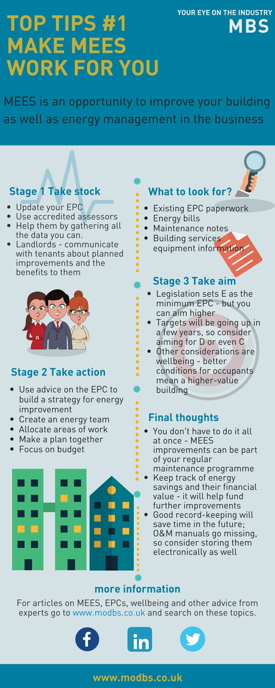MEES - a timebomb under the property industry

MBS looks at the latest research that shows EPC ratings look set to fall at an alarming rate, even in properties that are relatively well-managed. Computer modelling results make for difficult reading as the likely impact of MEES on property values becomes clear.
Although there is an April 1st deadline for the introduction of Minimum Energy Efficiency Standards (MEES), the structure of the legislation is such that not all properties (and landlords) will be affected at once.
MEES impacts mainly on property when a landlord is looking to grant a tenancy to new or existing tenants. At that point, if the Energy Performance Certificate (EPC) rating is F or G, the transaction cannot be completed. An assessment must then be undertaken to identify relevant efficiency improvements, which must be implemented.
Ahead of the game
Some commercial property owners have been hard at work reviewing their portfolios and looking into what can be done to improve (or divest) those buildings that don’t come up to scratch. What they’re trying to avoid is a nasty surprise down the line. And that’s a smart move given the sort of money involved in commercial property rentals.
Arbnco is a building energy simulation company and it has been using its software to examine the EPCs of 3,620 buildings on its system. The result was that 20% of these properties saw a fall into the sub-standard ratings of F and G.
Extrapolated to the whole UK commercial market, the Arbnco figures put over £130 billions of commercial property at risk of being unlettable due to low EPC ratings.
Simon West, co-founder and director of Arbnco, says: “For real estate investors with a large number of properties in their portfolio, the fact that almost 20% of buildings on our platform are performing worse than previously should come as a stark warning.
“It demonstrates how important it is for investors to continuously monitor and keep track of the properties in their portfolio.”
Changing conventions
The reason for the falling ratings of a significant number of buildings is not necessarily that they have somehow become much poorer energy performers themselves. One of the most surprising elements of the Arbnco research is that all of the properties had their most recent EPC accreditation less than five years ago and are considered to be well-managed properties.
However, the way that EPCs are measured has been updated reguarly since they were introduced in 2008. During that time, many of the underlying calculation methods and conventions have changed in order to reflect alterations in the overall performance of building services technologies; or changes to other legislation such as Part L of the Building Regulations.
 |
EPC conventions, for example, were introduced in June 2010 and in 2017 they reached Issue 6. These conventions dictate what assumptions an EPC assessor will make about the energy performance of equipment such as boilers in a building.
Grasp the nettle
The key message from the Arbnco research, and coming from experts at CIBSE and others, is that it is far better to know the facts about a building now than to find out when it’s too late. So updating the EPC as soon as possible is vital.
The EPC is at the heart of the MEES regulations. In its recent white paper on this issue (‘MEES: the implications for rent reviews, lease renewals and valuation’), Arbnco states: “It is clear that an EPC rating has the potential to impact value and the scope for disputes and litigation, with experts for both landlords and tenants making representations on the accuracy of the EPC, is high.”
Accuracy is key
EPCs report the carbon emissions from what are termed ‘regulated uses’. These include heating, mechanical ventilation, air conditioning, lighting and domestic hot water use.
One of the challenges for building owners is ensuring that they can find the information required for an EPC. Locating performance information for building services equipment such as AHUs or boilers, for example, can be difficult simply because these things are misplaced over time.
Without the performance data, an EPC assessor will have to make assumptions about the equipment performance which may very well lead to a lower EPC score.
As previously stated, MEES will not take effect for all landlords at the same time. But it could be a troublesome issue for those who don’t pay attention to EPCs and their recommendations - coming up time and again as leases are due for renewal. For a multipleproperty owner or manager this will be an ongoing challenge.
The Property Industry Alliance (PIA) report for 2017 shows that the average commercial lease length is now 7.2 years. While large organisations prefer longer leases, the vast majority of smaller companies want to keep leases reasonably short, so the issue of EPC ratings is unlikely to fade into the background.
Not going away
There are enormous implications for the property market. MEES looks set to become an important point of discussion with potential tenants.
Existing tenants may find themselves sharing the cost of improvements to a building (though that’s not necessarily a bad thing in the long-run).
The legislation introducing the concept of MEES was introduced as far back as 2011, so the property sector has had plenty of time to prepare, although it seems highly likely that many will be caught out by the Standards, nevertheless.
A sobering thought is that in five years (2023), landlords cannot continue to let a non-domestic property if that property has an EPC rating of F or G. And that really is a timebomb, even for landlords with long-term tenants.
The Arbnco white paper on MEES can be downloaded free from the link below.







